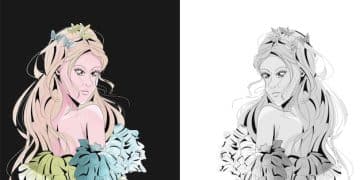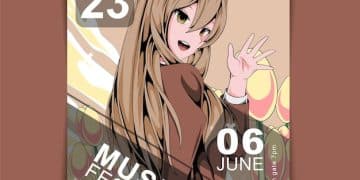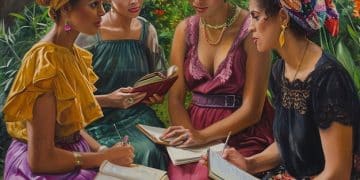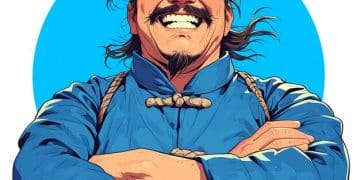The Anti-Hero’s Journey in Seinen Manga: Morality and Protagonists
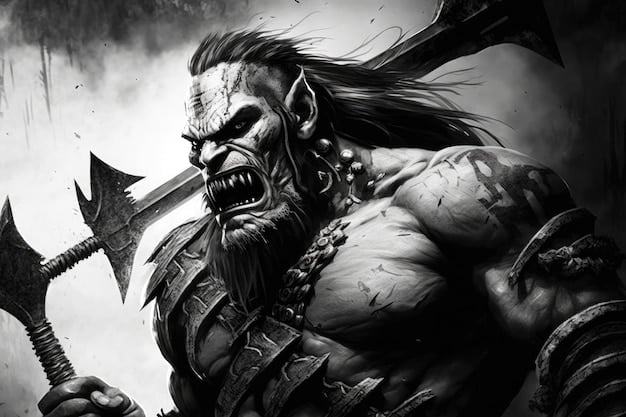
The Anti-Hero’s Journey: Exploring Moral Ambiguity in Seinen Manga Protagonists delves into the complex characters in seinen manga who, unlike traditional heroes, navigate narratives driven by personal desires and questionable ethics, offering a nuanced perspective on morality.
Explore the fascinating world of seinen manga and its morally ambiguous protagonists. Unlike your typical shonen heroes, these characters embark on The Anti-Hero’s Journey: Exploring Moral Ambiguity in Seinen Manga Protagonists, making questionable choices and challenging our perceptions of right and wrong.
Understanding the Anti-Hero in Seinen Manga
Seinen manga, targeted towards an older audience, often explores darker themes and complex character motivations. A staple of this genre is the anti-hero, a protagonist who lacks traditional heroic qualities and often operates in a gray area of morality. Understanding their characteristics is key to appreciating the depth of these narratives.
Defining the Anti-Hero
An anti-hero is a protagonist who lacks conventional heroic attributes such as idealism, courage, or morality. They may exhibit traits like cynicism, selfishness, and a lack of empathy, making them compelling but also morally questionable figures.
Seinen Manga’s Embrace of Moral Complexity
Seinen manga readily embraces moral complexity, presenting characters and situations that defy easy categorization. This allows for a more nuanced exploration of human nature and the consequences of actions in a world that isn’t black and white.
- Characters Driven by Personal Gain: Anti-heroes are often motivated by self-interest, revenge, or survival, rather than altruistic goals.
- Moral Ambiguity as a Narrative Tool: Anti-heroes introduce moral ambiguity, forcing audiences to question their own values.
- Realistic Portrayals of Flawed Individuals: Seinen manga offers more realistic portrayals of flawed individuals with complex motivations.
The anti-heroic figure in seinen manga is less about saving the world and more about navigating its complexities. They act in ways that reflect the grim realities often presented in adult-oriented manga, making choices that are difficult but arguably necessary.
The Core Elements of the Anti-Hero’s Journey
While the hero’s journey is a well-known narrative archetype, the anti-hero’s journey takes a different path, often subverting traditional expectations and exploring the darker aspects of human nature. The anti-hero’s journey is defined by inner turmoil and a pragmatic approach to problem-solving.
Rejection of the Call
Unlike the hero who readily accepts the call to adventure, the anti-hero may initially resist or reject it altogether, often due to cynicism, fear, or a lack of faith in their own abilities.
Moral Compromises and Shifting Loyalties
The anti-hero’s journey is marked by moral compromises and shifting loyalties as they navigate treacherous situations and make difficult choices that blur the lines between right and wrong.

- Moral Flexibility: An anti-hero rarely follows a strict moral code and is willing to break rules to achieve their goals.
- Ethical Dilemmas: They face constant ethical dilemmas without easy answers, leading to compromises and sacrifices.
- Questionable Methods: An anti-hero is willing to use methods that are deemed unacceptable by traditional heroic figures.
The journey of an anti-hero through the seinen manga landscape is marked by challenges that test their sense of self and moral fiber. The resolution of such a journey highlights the struggle to maintain one’s humanity amid chaos.
Iconic Anti-Heroes in Seinen Manga
Several characters in seinen manga exemplify the anti-hero archetype, each with their own unique motivations, flaws, and journeys. Analyzing these characters provides insight into the appeal and complexity of the anti-hero in seinen manga.
Guts from Berserk: The Relentless Survivor
Guts, the protagonist of Berserk, is a prime example of an anti-hero driven by rage and a thirst for revenge. His brutal past and relentless determination to survive in a dark and unforgiving world make him a compelling, albeit morally ambiguous, figure.
Thorfinn from Vinland Saga: The Path to Redemption
Thorfinn, from Vinland Saga, begins as a revenge-driven warrior but gradually undergoes a transformation as he grapples with the futility of violence and seeks a more meaningful path in life. His journey is one of redemption and self-discovery.
- Character Development: These anti-heroes often exhibit significant character development, either for better or worse.
- Redemption Arcs: Some anti-heroes seek redemption, while others embrace their darker nature.
- Complex Motivations: These characters have motivations that go beyond simple good and evil.
Characters like Guts and Thorfinn demonstrate varying facets of the anti-hero in seinen manga. They challenge readers to confront their own moral standards and empathize with characters who are far from perfect.
Moral Ambiguity as a Reflection of Reality
The moral ambiguity found in seinen manga often reflects the complexities of the real world, where clear-cut distinctions between right and wrong are rare. The anti-hero becomes a vehicle for exploring these nuances and challenging conventional moral frameworks.
Gray Areas of Morality
Seinen manga often presents characters and situations that exist in the gray areas of morality, where decisions are not simply good or bad but involve complex trade-offs and unintended consequences.
Challenging Conventional Notions of Good and Evil
Anti-heroes challenge conventional notions of good and evil by demonstrating that even those who commit morally questionable acts can possess admirable qualities or be driven by understandable motivations.
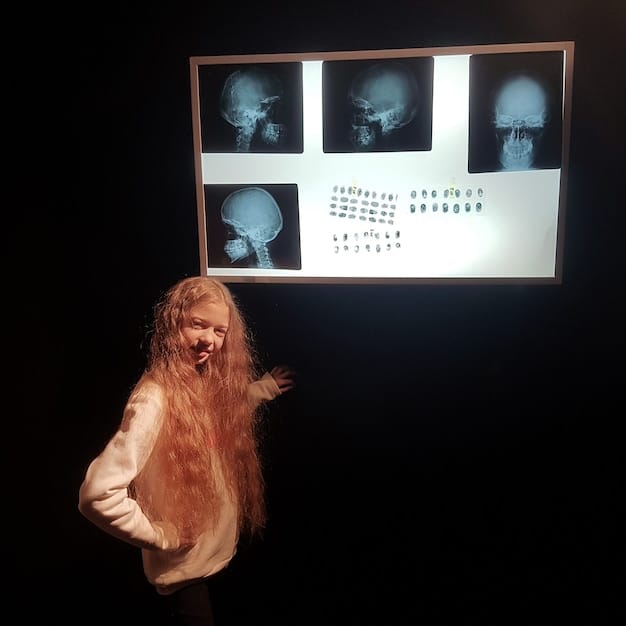
- Ethical Relativism: Seinen manga may explore ethical relativism, showing how values and morality depend on personal standpoints.
- Breaking Down Idealism: The complexity of the anti-hero deconstructs simplistic and idealistic notions of heroism.
- Realistic Consequences: Characters face realistic consequences for decisions made in morally ambiguous situations.
The acceptance of moral ambiguity allows seinen manga to mirror the real-world acceptance of difficult ethical questions and challenges viewers to think critically about how they perceive character and circumstance.
Impact on the Reader
The anti-hero’s journey in seinen manga can have a profound impact on the reader, prompting introspection, empathy, and a reevaluation of personal values. The stories challenge readers to confront uncomfortable truths and consider alternative perspectives.
Fostering Empathy for Flawed Characters
Despite their flaws and questionable actions, anti-heroes can evoke empathy in readers who recognize the humanity behind their choices and struggles.
Encouraging Introspection and Moral Reflection
The anti-hero’s journey encourages introspection and moral reflection as readers contemplate the characters’ decisions and their own moral compass.
- Provoking Thought: The challenging nature of the anti-hero provokes serious thought about social and individual moral standards.
- Enhancing Perspective: Seeing the world through the eyes of an anti-hero enhances one’s perspective regarding human motivation and behavior.
- Creating Emotional Connections: The vulnerabilities of anti-heroes craft deep emotional connections with the audience, despite their flaws.
Engagement with an anti-hero in seinen manga can be transformative, offering a deeper understanding of human complexities and societal challenges.
The Future of Anti-Heroes in Seinen Manga
As seinen manga continues to evolve, so too will the portrayal of anti-heroes and the exploration of moral ambiguity. The genre is likely to continue pushing boundaries and challenging conventions, offering new and innovative narratives that resonate with audiences.
Evolving Character Archetypes
Future seinen manga works may explore even more complex and nuanced anti-hero archetypes, blurring the lines between protagonist and antagonist and challenging readers’ expectations.
Deeper Exploration of Ethical Dilemmas
Seinen manga could delve even deeper into ethical dilemmas, exploring the psychological and social consequences of moral choices and prompting readers to confront uncomfortable truths about themselves and the world around them.
- Experimentation with Storytelling: Innovative narrative structures may be used to explore complex moral questions.
- Psychological Depth: Future anti-heroes may be portrayed with even greater psychological depth, emphasizing internal struggles.
- Social Commentary: The anti-hero’s journey may be used as a vehicle for stronger social commentary.
The exploration of anti-heroes and moral ambiguity is a timeless theme, and future seinen manga series are expected to further revolutionize this aspect of storytelling and artistic expression.
| Key Concept | Brief Description |
|---|---|
| 🤔 Moral Ambiguity | Gray area situations where right and wrong aren’t clear. |
| ⚔️ Anti-Hero | Protagonist lacking conventional heroic qualities. |
| 🔄 Redemption | Some anti-heroes seek to atone for past actions. |
| 🎭 Realism | Stories reflect real-world moral complexities. |
Frequently Asked Questions
▼
An anti-hero is a protagonist lacking traditional heroic traits, often driven by personal gain rather than altruism. They inhabit moral gray areas, making choices that challenge conventional notions of right and wrong.
▼
Moral ambiguity allows for a realistic exploration of complex ethical questions. It makes characters more relatable as they grapple with tough choices without easy, clear-cut answers.
▼
Yes, many anti-heroes in seinen manga embark on journeys of redemption. Through hardship and self-reflection, they may atone for past wrongs and find a more morally aligned path.
▼
Anti-heroes prompt introspection and encourage readers to confront uncomfortable truths. They foster empathy for flawed characters, enhancing perspective and emotional connection with the narrative.
▼
Anti-heroes offer relatable narratives with complex motivations that resonate with audiences. The flawed characters reflect real-world ethical questions and provide thought-provoking content for critical readers.
Conclusion
The anti-hero’s journey in seinen manga provides a compelling exploration of moral ambiguity, challenging readers to question their own values and consider the complexities of human nature. The genre’s willingness to embrace flawed characters and nuanced narratives ensures its continued relevance and impact on audiences.
